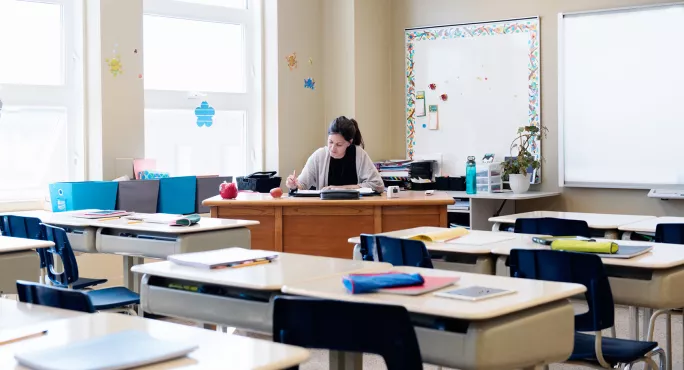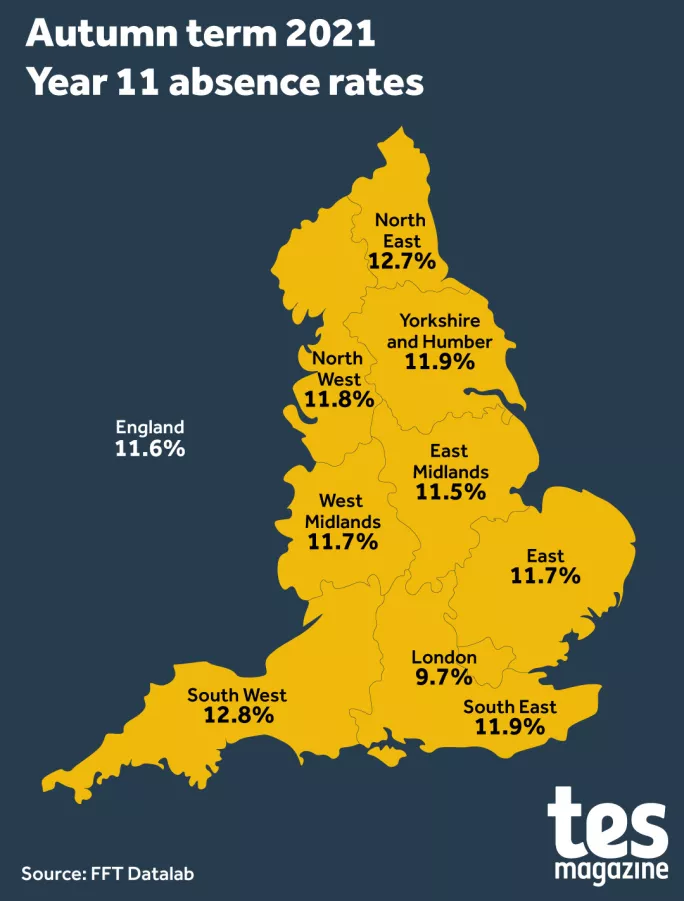Exam ‘nervousness’ as Year 11s top Covid absence rates

The disruption to attendance in schools due to the Omicron variant of Covid-19 is already causing “nervousness” over summer exams, as new data shows Year 11 students missed the most amount of school during the autumn term.
An average of 11.5 per cent of sessions (half a day of schooling per week) were missed by Year 11 students last term, amounting to seven lost days across a 14-week term. That was the highest absence rate among secondary year groups, according to an FFT Education Datalab analysis of attendance data from a representative sample of 2,400 secondary schools.
GCSE students in the South West missed the most amount of school last term, with 12.8 per cent of sessions missed, closely followed by the North East with 12.7 per cent of sessions missed (see map below).
The data is revealed after education secretary Nadhim Zahawi told the BBC’s Sunday Morning show that he was determined exams should take place - both this term and in the summer.
“My absolute commitment is that exams are going ahead both this January and for the summer, for GCSEs and A levels,” he said, although he added that the government understands Omicron was already causing disruption to this and needed to be taken into account.
“We’re putting in mitigations to make sure that we recognise [those students] who have had their education disruption.”
- Digital papers: Online GCSE tests to be piloted by exam board AQA
- Return to school: Masks back in classrooms to tackle Omicron surge
- 2022 exam plans: Covid and schools: 4 key points from Nadhim Zahawi today
Meanwhile, schools have told Tes they are “moving heaven and earth” to make sure mock exams starting this week can go ahead to ensure there is data on where students need to prioritise learning for summer exams - and to ensure there is a set of robust data should any form of assessed grades be needed again.
This includes asking parents of pupils who are at home isolating but well enough to take the assessments to sign “confidentiality agreements” confirming the papers are sat under exam conditions and possible remote invigilation of exams over video software.

The comments come as the Department for Education reiterated mocks should be taking place “under exam conditions or as close to exam conditions as possible”.
In an update email sent to heads on Friday, seen by Tes, the DfE said: “We recommend centres also follow this guidance for mock exams and other assessments taking place under exam conditions or as close to exam conditions as possible, including those taking place to gather evidence for Teacher Assessed Grades under the guidance published by Ofqual on Thursday 11 November. This includes circumstances where these assessments take place in classrooms.”
Geoff Barton, general secretary of the Association of School and College Leaders, said it was clear the situation around Omicron and absence rates had given mock exams this term an extra level of importance.
“Given the level of disruption reported by some schools in the first few days of the spring term, there will undoubtedly be some nervousness around the subject of exams,” he said.
He added: “Schools and colleges recognise the importance of the coming weeks and months for all students facing exams and will be focused on offering them the support and guidance they need.”
Confidentiality agreements
Indeed, to ensure mocks can go ahead whatever the situation a pupil is facing, it is clear schools are putting many contingencies in place.
One deputy head at a private school told Tes that mocks for both Year 11 and Year 13 will begin on Monday and that they have put contingencies in place should any students have to sit exams remotely.
“If pupils are absent with Covid-19 but well enough to do the exams, we will ask parents to collect and supervise these papers at home,” the deputy headteacher of an independent school in London told Tes.
“Parents who have pupils at home taking exams will sign a confidentiality agreement confirming that the papers will be completed under examination conditions.”
They also confirmed they would be using Microsoft Teams to invigilate remotely, with external invigilators undertaking this work.
Jane Lunnon, head of Alleyn’s School, told Tes that although there was no expectation at present to have any students sit exams remotely, if needed, it too would require confidentially agreements for exams sat at home.
“Should the situation around absences or Covid numbers get worse, we will then run online assessments, which would be invigilated online,” she told Tes.
“And we would expect students and parents to sign exam code of conduct agreements, should that need to be the case.”
Lunnon also said that remote invigilation could be used too, with Astrid McAuliffe, deputy head (academic) at Alleyn’s School explaining it had already invigilated students via Teams in January 2021 to ensure the integrity of the scores that were used to inform TAGs.
Lunnon said the key was that whatever happened mocks would go ahead, given their potential importance to any exam contingency plans that may have to be unveiled.
“We will move heaven and earth not to cancel them because [...] they have taken on added significance because they will be forming part of the government’s contingency plans.”
Potential student absence
Meanwhile, Claire Heald, director of education at the Academies Enterprise Trust (AET), told Tes that given the “the potential for student absence” the Omicron situation has created, the Trust is also considering how it could let pupils sit them remotely if required.
“AET is in the positive position of having been able to provide all our pupils with Chromebooks so sitting mocks remotely is something we can practically do,” she said.
“Many other schools and trusts will also take this approach.”
However, Patrick Cozier, headteacher at Highgate Wood School, said that although his school would explore how pupils could sit mocks at home if required, it would not go as far as using confidentially agreements.
“In terms of students who are at home isolating, we would explore ways for them to sit their mock exams separately when well enough to do so, preferably in school. We have (on occasions) sent papers home, but this is rare and a last resort. We don’t use confidentiality agreements for mock exams.”
He also said he was confident that staff absences through any rising Omicron infections would not disrupt mocks.
“For us, staffing is not an issue as we have a team of exam invigilators (separate from our teaching staff) who administer and supervise all of the exams,” he said.
“If we have any issues with Covid in relation to the staff we employ as invigilators, we will seek replacements through an agency. We don’t envisage a situation where we would have to cancel the exams.”
Meanwhile, Mohsen Ojja, acting CEO of the Mossbourne Federation, said that at present it was adopting a ”business-as-usual approach to mock exams” but that it was aware the situation could still change.
“Should the guidance on school openings change, we will plan accordingly to make sure that our students still have a chance to prepare in exam conditions in a safe manner,” he said.
He added though that he hoped in-person exams for both mocks and summer assessment would go ahead as normal.
”We firmly believe that the best place for students is in the classroom and that exams are crucial, and we will continue to do everything we can to make this the reality as our Year 11 and Year 13 students approach this important milestone and right of passage.”
Vince Green, education director at Summit Learning Trust in Birmingham that includes three secondary schools and a sixth form college, said it too was working hard to ensure mocks would take place - including establishing students familiarity with exam conditions.
“This cohort of students have missed some previous experiences of examination conditions due to the interruptions they faced in Years 9 and 10, and we want them all to be familiar with these to ensure that they can enter summer examinations with confidence,” he said.
He noted too, like others, that they were also aware they could be used for any non-exam assessed end of year grades - even if the government has said it is determined exams will go ahead.
“The results from these assessments will provide us with essential information to support our learners as they prepare for their final examinations in the summer,” he said.
“In the event of national examinations being cancelled or cut-back, which we hope will not be the case, these assessments will be one element of the evidence we will need to analyse in order to calculate centre assessed grades.”
Preparing for the unknown
In a statement, Ofqual said it “recognised how hard everyone in the sector is working to help students prepare for and achieve their qualifications” and said that guidance would be given on assessment weighting if the government decided to cancel exams.
”The government has confirmed its commitment to exams going ahead this summer. Taking mocks will help students to prepare for those exams and schools understandably want their students to take mocks if they can,” Ofqual said.
It noted though that if exams were cancelled a ”student’s performance in a mock could be taken into account by a teacher when determining the student’s teacher assessed grade,” underlining why it is so key they go ahead.
However, Ofqual noted that there would be other measures used too: ”As we said when our contingency arrangements were published in November, if exams were cancelled, teachers would be given guidance on the weight they should give to the different assessments and how they should take into account the conditions under which the assessments were taken.”
Meanwhile, Barton at ASCL added that he was hoping the advanced information on exam topics Ofqual has committed to releasing next month will be ”helpful in focusing teaching, learning and revision and in assisting students to succeed in their exams during what is another extremely difficult year”.
Additional reporting by Matilda Martin
You need a Tes subscription to read this article
Subscribe now to read this article and get other subscriber-only content:
- Unlimited access to all Tes magazine content
- Exclusive subscriber-only stories
- Award-winning email newsletters
Already a subscriber? Log in
You need a subscription to read this article
Subscribe now to read this article and get other subscriber-only content, including:
- Unlimited access to all Tes magazine content
- Exclusive subscriber-only stories
- Award-winning email newsletters
topics in this article



